Toward a More Equal America, Part 11
In Part 10 I introduced the political plane and situated the United States within it: approximately halfway between democracy and authoritarianism, and with more private ownership than public ownership.
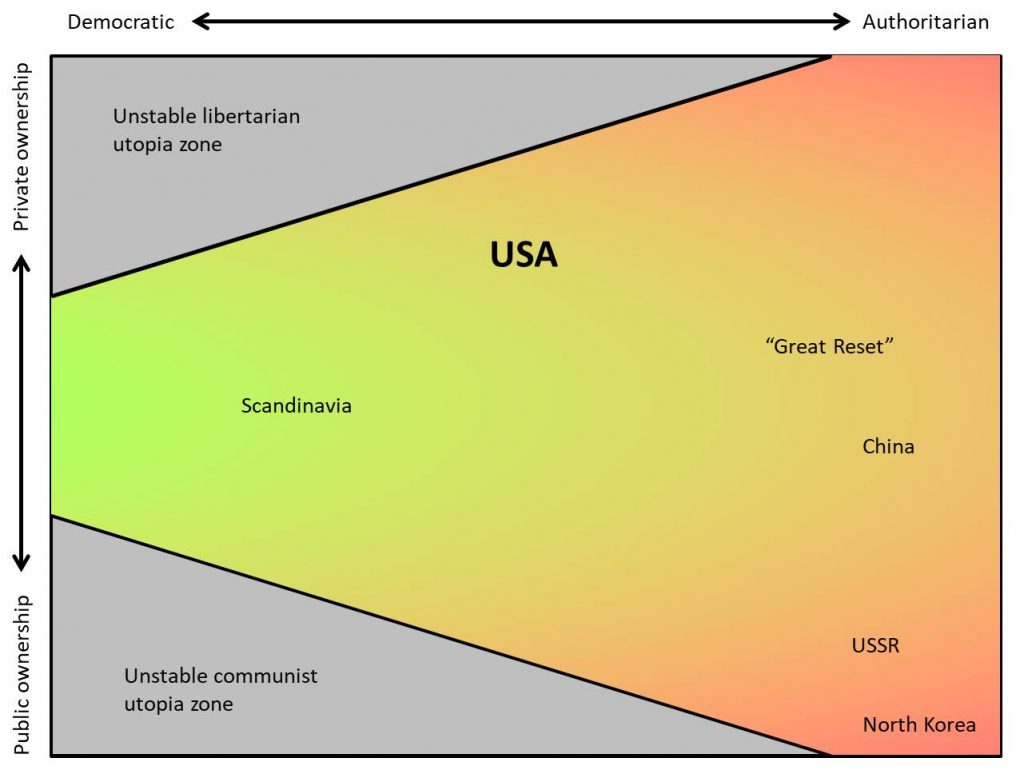
At this point, I want to take a closer look at where on this plane we are headed and where we might prefer to go instead. To get a sense of that, it’s helpful to consider which other axes are collinear with the spectrum from democracy to authoritarianism.
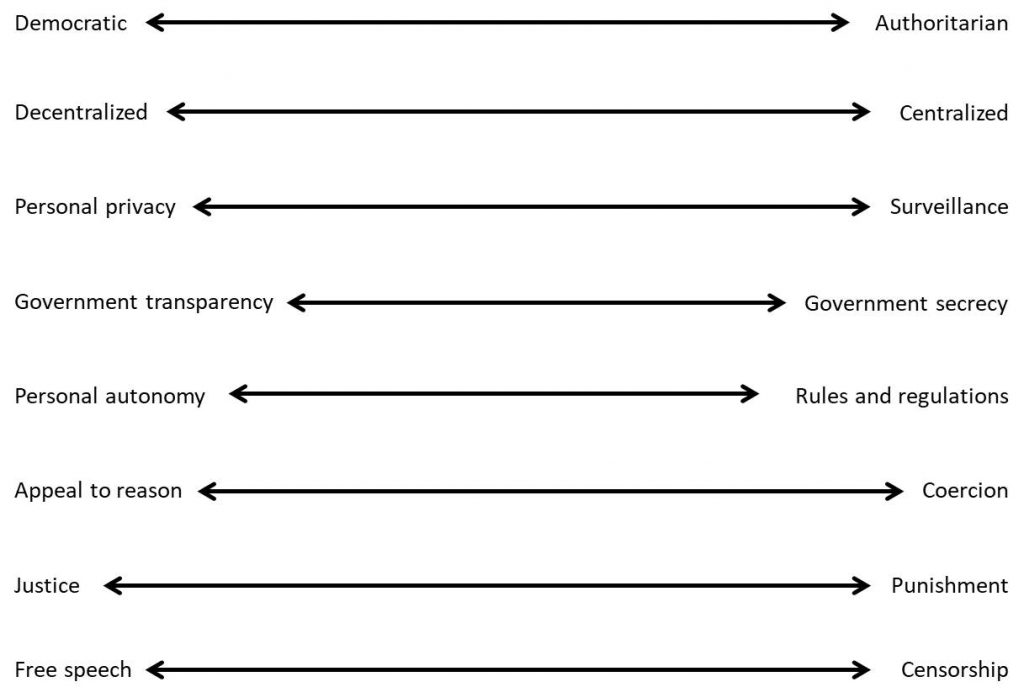
It is quite clear to me that the United States is currently moving toward the right along most of these axes, with larger movements justified by “attacks on democracy” such as 9/11 and the recent Capitol riot. This is being supported by both major parties, which differ on the political plane primarily in their allegiance to unrestricted capitalism (Republicans) or to a rather bureaucratic and centralized vision of providing a basic level of social welfare to the lower classes (Democrats). Republicans blame individuals for failure to succeed, while remaining stubbornly unwilling to examine the structural factors (e.g. outsourcing, downsizing, benefit-cutting, discrimination, etc.) that render success impossible for many, and actively supporting a perpetuation of those factors. Democrats blame systemic failures, but offer handout-type solutions that only create dependency while disempowering individuals and strengthening those same corrupt systems. Libertarians, a minority, are vocally opposed to this movement toward authoritarianism, but their vision of a world structured on unregulated capitalism and personal autonomy leads into the unstable gray zone.
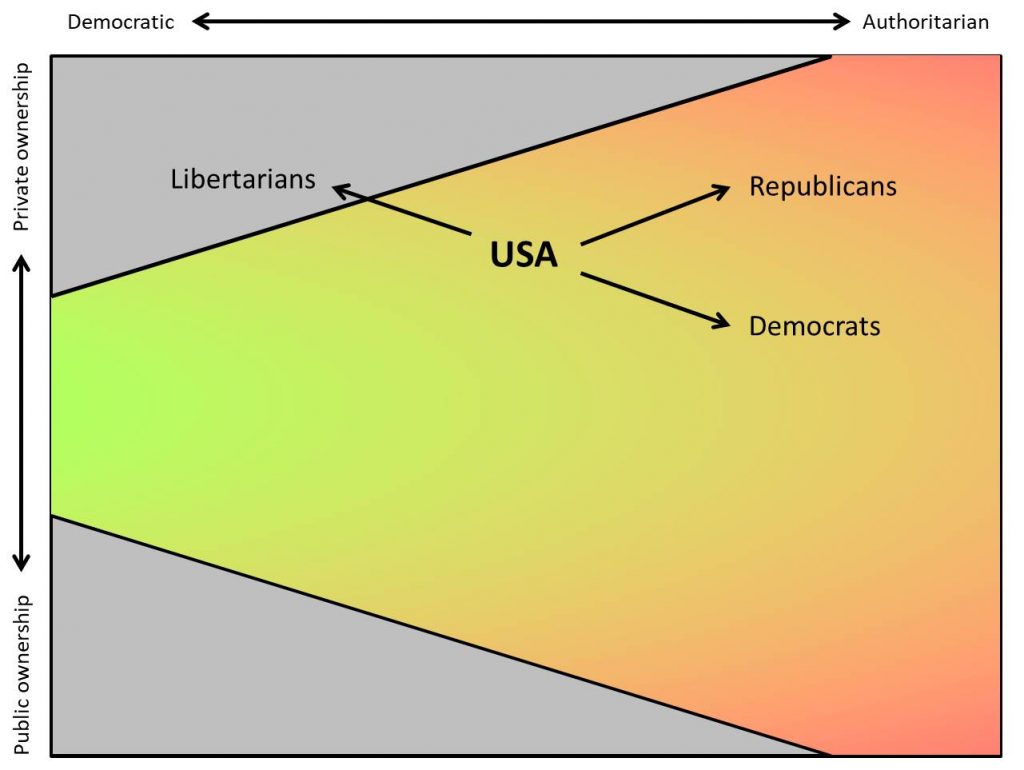
Republicans fear “socialism”, by which they mean authoritarianism imposed by Democrats. Democrats fear “fascism”, by which they mean authoritarianism imposed by Republicans. When in power, both sides – in an attempt to impose their will on their opponents by force – enact laws and executive orders that move our nation closer to an authoritarian reality.
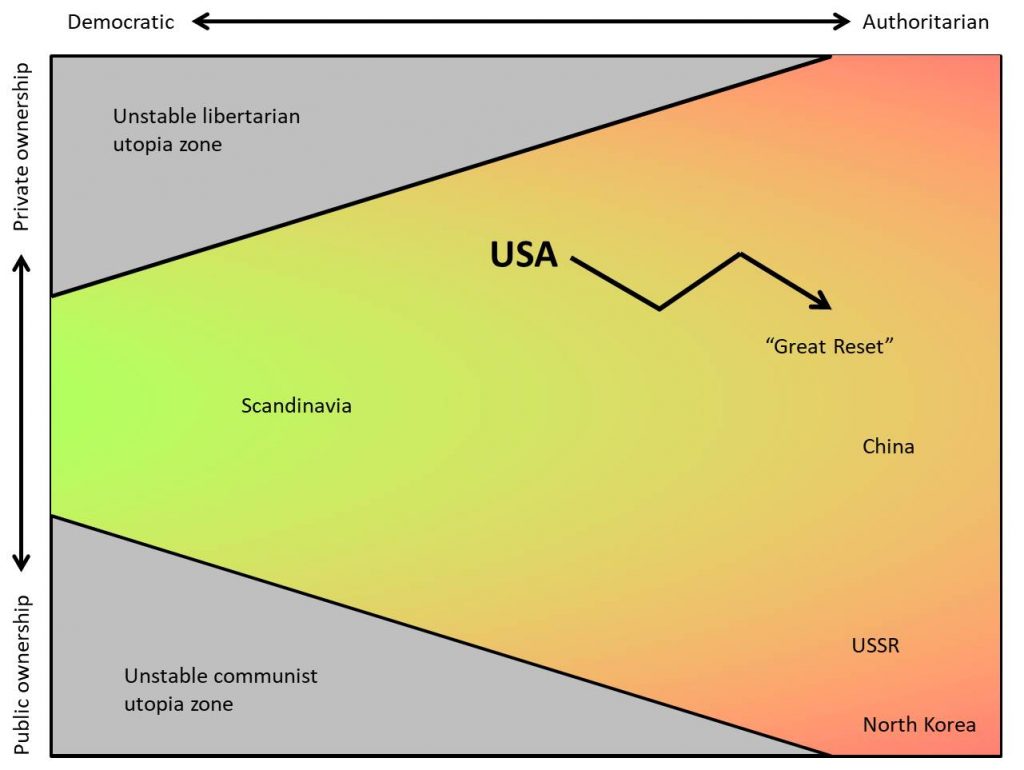
For the past fifty years or so, and accelerating in the current time, we have been following a zigzag path toward greater corporate influence, greater government secrecy, less personal privacy, increased rules and regulations, increased surveillance, and decreased faith in representative democracy – even as we oscillate back and forth between right-leaning privatization and left-leaning public provision. The Great Reset is simply the logical endpoint of this progression, warmed over with a patina of orderliness, climate justice, and “happy people” who own nothing and don’t think too hard or dream too big. Such a world would be not unlike modern China with its social credit scores and all-encompassing surveillance, except with a bit more corporate power and less government control.
Before I address how we might put a stop to this agenda, we need to look at the societal factors that drive movement on the political plane. From my perspective, it looks like this:
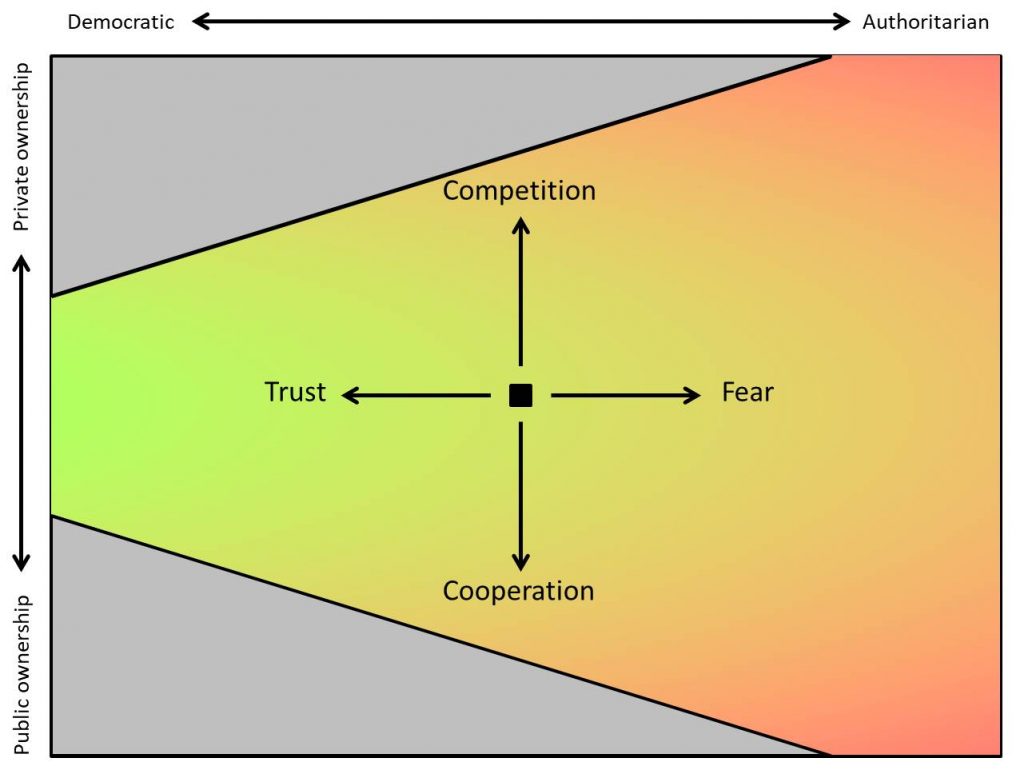
Our desire for competition leads us to innovate and create under private ownership, while our desire for cooperation leads us to build systems that provide public utilities and public goods. To thrive we must find a way to balance those desires, but it is the horizontal axis that is more concerning in this moment.
Fear is the path to the dark side.
Fear leads to anger.
Anger leads to hate
Hate leads to suffering.
Yoda
We inhabit a world awash with fear. We fear those who have guns, those who would take our guns away, those who don’t wear masks, those who would force us to wear masks against our will, those who are immigrants, those who dislike immigrants, police who use lethal force without just cause, protesters who torch and loot, those who refuse vaccines, those who would force vaccines upon us, those who voted for Trump, those who voted for Biden. We fear each other. And so we are angry at each other. And so we hate each other. And so we all suffer.
It is especially telling that neither of the two political poles devotes much energy to developing policies that would improve lives, preferring instead to mount a series of never-ending attacks against the other side. We no longer seek to build coalitions, to find common ground, to seek compromise. Instead we seek to win, and when we have “won” by the narrowest of margins, we proceed to impose our will, by force, against the losing side. The current “domestic terrorism” mania on the left which seeks to punish the entire right-of-center populace based on the actions of a few unhinged rioters – and to assume that these people could only be motivated by such negative ideals as white supremacy and bigotry – is simply the latest manifestation of this trend.
Countries with authoritarian governments tend to be those with opposing factions which cannot establish dialogue. Sunni and Shia Muslims in Iraq. Islamists and Anti-Islamists across the Middle East. Authoritarian regimes which effectively quashed opposition all began with this sort of conflict. The Nazis against the Communists in 1920s Germany. The Bolsheviks against the Russian Republic. Anyone who wishes to avoid this sort of authoritarian future ought to see the warning signs in current events. No matter how much we might fear the other side, following our fear-based desire to impose our agenda against them by force can only lead farther away from democracy and closer to authoritarianism.
In order to put an end to our collective movement toward authoritarianism, we will have to provide an alternative to fear. We will need to begin to rebuild trust in each other – not fragmenting by identity or party lines, but recognizing the humanity, the unique and irreplaceable value, in each of us. We will need to let go of our desire to control how others live, what choices they can make, what thoughts they can have – while encouraging them to also let go of their desires to control us.
We do not all need to agree. We can continue to debate exactly when a fetus becomes a human being, which guns should be legal to own, how much immigration is good for our nation and how much is problematic, how best to balance timber jobs with a desire to protect remaining forests. The only route to a homogeneous pseudo-utopian future lies through war and genocide, and I hope that we all can realize that before we continue much further down our current path. If we wish to change minds, we must first build bridges. One who is our enemy is closed to us, hardened against our message, unchangeable except through annihilation or imprisonment.
We need to rebuild trust and cooperation to begin to move in a direction that no current political forces are leading us – back toward democracy and also toward greater cooperation and recognition of public goods, against the forces of unbridled capitalism.
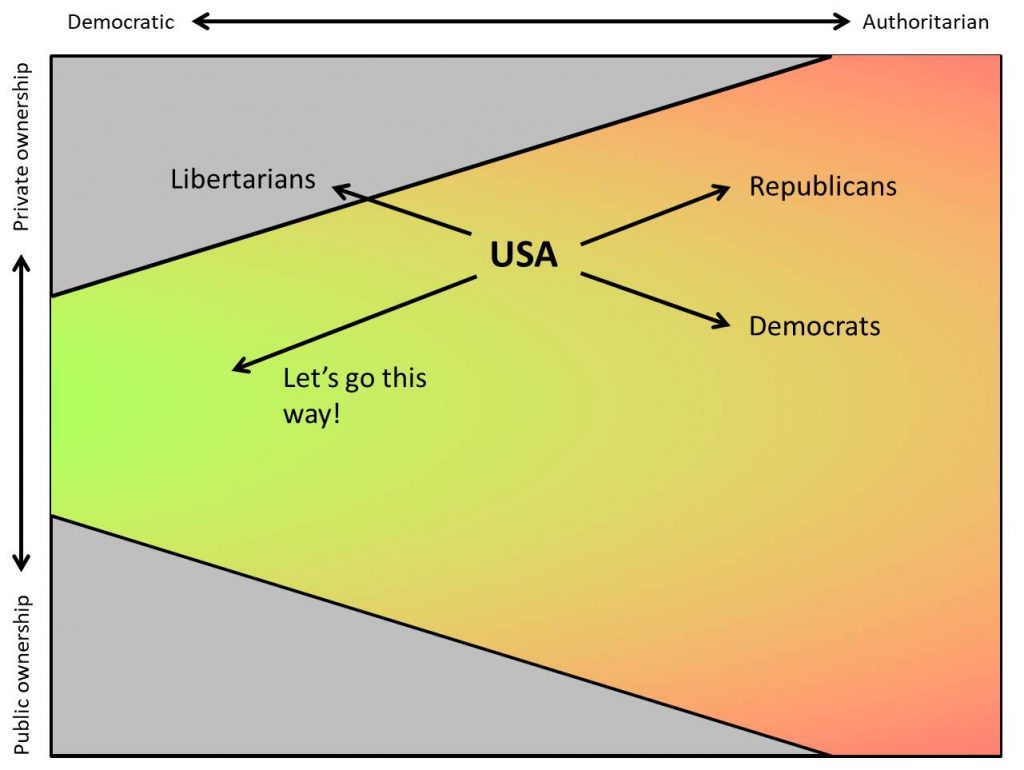
If Martin Luther King Jr. were alive today, he would surely be disappointed by the direction our nation is heading. Let us heed his wisdom as we seek to build bridges, to restore trust, and to move our nation back toward true democracy.
I want to say to you as I move to my conclusion, as we talk about “where do we go from here?” that we must honestly face the fact that the movement must address itself to the question of restructuring the whole of American society…
Now, don’t think you have me in a bind today. I’m not talking about communism. What I’m talking about is far beyond communism. …Communism forgets that life is individual. Capitalism forgets that life is social. And the kingdom of brotherhood is found neither in the thesis of communism nor the antithesis of capitalism, but in a higher synthesis. It is found in a higher synthesis that combines the truths of both. Now, when I say questioning the whole society, it means ultimately coming to see that the problem of racism, the problem of economic exploitation, and the problem of war are all tied together. These are the triple evils that are interrelated…
And I must confess, my friends, that the road ahead will not always be smooth. There will still be rocky places of frustration and meandering points of bewilderment. There will be inevitable setbacks here and there. And there will be those moments when the buoyancy of hope will be transformed into the fatigue of despair. Our dreams will sometimes be shattered and our ethereal hopes blasted. We may again, with tear-drenched eyes, have to stand before the bier of some courageous civil rights worker whose life will be snuffed out by the dastardly acts of bloodthirsty mobs. But difficult and painful as it is, we must walk on in the days ahead with an audacious faith in the future….Martin Luther King, Jr. 1967. “Where Do We Go From Here?”
When our days become dreary with low-hovering clouds of despair, and when our nights become darker than a thousand midnights, let us remember that there is a creative force in this universe working to pull down the gigantic mountains of evil, a power that is able to make a way out of no way and transform dark yesterdays into bright tomorrows. Let us realize that the arc of the moral universe is long, but it bends toward justice.”

3 Responses to The Road Less Traveled